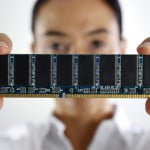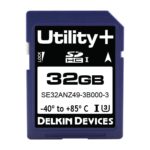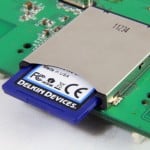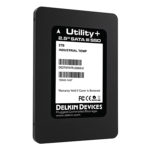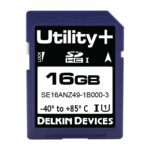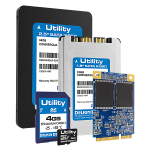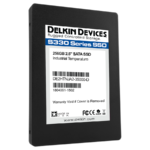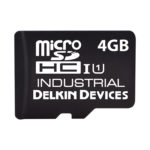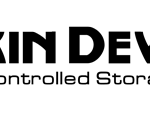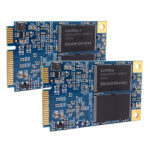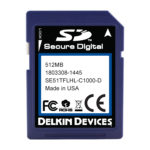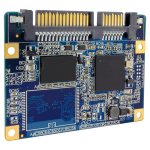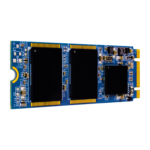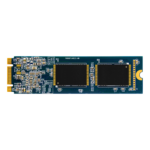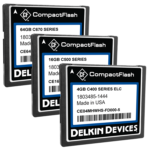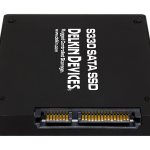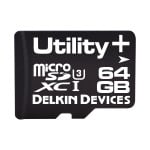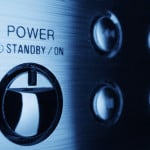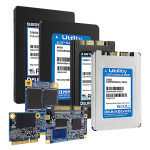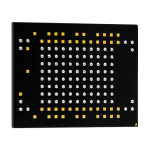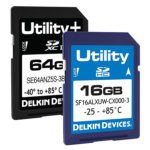Delkin Blog
Why Secure Erase Matters in Industrial Storage
Industrial flash storage has revolutionized computing. Flash drives offer greater reliability than hard drives, and they are also smaller and faster with lower power needs. However, one factor that many people in need of industrial storage are concerned about is the ability to erase data completely. Flash drives store data in a different way than hard drives, and because of that, erasing them is not as straightforward. Because many industrial applications store information that is sensitive, being able to...
Read More
Read More
Highlighting the Importance of Conformal Coating
Flash memory cards contain complex circuitry and components. These sensitive systems are often exposed to extreme conditions, especially when they are used in rugged applications. The key to protecting them is conformal coating. Conformal coating is a must-have on industrial grade embedded storage, so that memory cards and the valuable data that they hold are protected from environmental conditions that could cause damage. There are multiple kinds of conformal coating that can be found on memory cards. Here is...
Read More
Read More
Comparing Industrial and Utility Cards
When choosing embedded flash memory for an application, the grade of the card is one of the most significant factors. Industrial and utility cards are used in both commercial and industrial operations, but they have different features. As such, when deciding between industrial and utility cards, it’s important to consider the features that are most important to the design of your application and how it will be used. Delkin makes both industrial and utility products, and our team can...
Read More
Read More
Flash Storage Deconstructed- Improve Write Life with Simple Changes
Anatomy of a Flash Storage Device To the casual user, a FLASH card seems like the perfect simple device that you can write to as much as you need, and it remembers the data when you power it off. This is true in the simplest form; however, FLASH technology requires a CPU with highly complex firmware onboard to manage the device interface and the complex challenges of FLASH memory chips. Neglecting this advanced firmware can lead to early failure and...
Read More
Read More
Technical Success Story: Solving SD Card Customization Issues
Background: A frequent Delkin SD card customer needed to expand the use and data output of their application. When testing content loading equipment, or duplicators, they discovered that their SD cards were failing when the duplicators added data. Because they had orders coming in, they needed to quickly find a solution to the problem. Customer Story: After purchasing new duplicator equipment, the OEM experienced a series of failures in their SD cards when loading data. The SD cards ran fine...
Read More
Read More
Examining SLC SD in Electrocardiography, Endoscopes, and Other Medical Devices
In modern medical equipment, embedded storage is a necessity. It is used for both patient data storage and OS and application loading. With advances in medical technology comes the need for larger storage capacities more than ever before. A reliable option for electrocardiography and endoscopes—which have high demands for storage—is industrial SLC SD cards. Using SLC SD in electrocardiography, endoscopes, and other medical technology ensures reliable storage for critical data with low power demands, MTBF, and EOL process management. What...
Read More
Read More
What Are Solid State Memory Drives?
Solid state memory drives, often referred to as solid state drives, or SSDs, are an alternative to hard disk drives (HDDs). They are usually equipped with flash memory, in which data are stored on chips within the drive. Although solid state memory drives are nothing new, they have only been widely embraced in consumer and industrial devices in recent years. Since then, they have all but replaced hard disk drives in many of the devices people use most often....
Read More
Read More
OEM Sales Solutions
OEM sales play a critical role in many different consumer and industrial applications and devices. Successful OEM sales rely on a strong relationship with the product manufacturer and on sourcing high-quality products from that manufacturer. At Delkin, we are committed to helping OEMs get the reliable, customized products they need to satisfy their customers. Here is a look at how we can help with OEM sales solutions. OEM Basics Outside of the technology industry, OEM—original equipment manufacturer—refers to a company that...
Read More
Read More
SD Card Advice V2 for Zynq and Zynq UltraScale+ SoC Products
Check out this helpful information on SD . Below is a link to download an update to the list of suggestions as well as helpful information that will guide Engineers working with Xilinx Zynq®‐7000 and Zynq® UltraScale+ SOC based solutions from Avnet. Advice is provided for selecting and working with SD cards for their own system designs. CLICK HERE TO DOWNLOAD DOCUMENT
Read More
Read More
The Importance of ELC Products for Industrial Applications
Extended life cycle, or ELC, products are essential components of many industrial applications. With ELC products, OEMs get the support they need throughout the life of their existing products, and they get assistance with transitioning to a new product when their existing storage device or other component is being discontinued. At Delkin, all of our storage solutions are ELC products, which gives our customers the confidence they need to manage their applications without concerns about unexpected component changes. Here...
Read More
Read More
Understanding Types of Form Factors
If you’ve been shopping for embedded storage, a term you are likely to have encountered is form factor. Form factor refers to the design of a piece of hardware. Types of form factors are differentiated based on their layout and dimensions. Knowing the form factor is key to preventing compatibility issues. When it comes to solid state storage (SSS), there are three main form factors: solid state drives, solid state cards, and solid state modules. Here is what you...
Read More
Read More
Choosing Solid State Storage Companies
Solid state storage is the preferred form of storage for industrial applications, but where that storage comes from matters. There are several factors to consider when choosing between solid state storage companies. By choosing the right company, you can feel confident in the storage selection you’ve made for your application and in the knowledge that you will have support when you need it. If you’re in the market for solid state storage, this information will help you select the...
Read More
Read More
Infotainment Applications in Embedded Systems – Changing the Way We Travel
Embedded systems have had a major impact on a long list of industries. In transportation, embedded systems are changing many things about the way we travel, but one of their most notable impacts is with on-board infotainment systems. If you have watched a movie on a plane or listened to satellite radio in a car, then you have likely used infotainment embedded systems. When embedded systems are used for these purposes, they are usually designed with SLC NAND flash,...
Read More
Read More
Taking a Closer Look at SSD Utility Systems
SSD utility systems are available in a variety of capacities and in both commercial and industrial grades. This means that finding SSD utility systems that are the right fit for a variety of applications is straightforward for OEMs. Getting the right capacity and temperature grade allows for the maximum level of efficiency possible, without wasting capacity or trying to get by with too little storage space. SSD 101 SSD stands for solid state drive. Although SSDs actually have a long history,...
Read More
Read More
Choosing a microSD Memory Supplier
The microSD memory card, sometimes called micro SD, is a popular, high-endurance flash storage solution that is widely used in both commercial and industrial grade applications. The format was originally introduced in 1999, and was designed as a NAND flash storage solution for portable devices that had the features those devices needed, like low power consumption, a high degree of reliability, and a small size to fit into constrained spaces. Design specifications for microSD cards are set by the...
Read More
Read More
Finding Storage Solutions for Industrial Applications
Whether they’re helping to provide access to critical patient records for doctors in emergency situations or helping a train travel down the track safely and efficiently, industrial applications have to work flawlessly every time. For this reason, embedded storage in industrial applications has to be reliable, trustworthy, and fast. The same embedded storage that works perfectly well in consumer products in the commercial market may not be able to stand up to the demands of industrial applications. It is...
Read More
Read More
Encrypted SSD Explained
If you are storing sensitive data, or even if you just want the knowledge that your information is private, then an encrypted SSD could be the right solution. Encrypted SSD makes your info unintelligible to anyone who doesn’t have the proper security clearance to view it. There are several different types of encryption used in SSDs, but the final outcome of each is the same: outside users will find it very different to access your important data. Data Encryption 101 Although...
Read More
Read More
Using Embedded Systems in Healthcare
An embedded system is part of a larger operating system that is designed to perform one or two specific tasks. In the healthcare field, embedded systems are often used for data storage. Since healthcare applications may be used in rugged operating conditions with temperature fluctuations and exposure to shock and vibrations, it is usually necessary for OEMs to choose industrial grade embedded systems. Industrial grade products are designed for use in those demanding conditions and can withstand them without...
Read More
Read More
Why Delkin Is a Leading Flash Memory Manufacturer
When you need flash memory for an industrial application, the flash memory manufacturer you choose matters. At Delkin, we’re proud to be a leading flash memory manufacturer and believe that any customer who tries our products will find out for themselves why so many OEMs rely on us. We recognize the importance of the security of your data and of having dependable memory solutions that don’t change designs without notice. Here is a look at some of the reasons...
Read More
Read More
Solving Medical Data Storage Issues
With so many medical providers switching from paper records to electronic ones, medical data storage is a bigger issue than ever before. This switch has made keeping track of patients’ needs easier for doctors—and made treatments safer and more efficient for patients. However, medical data storage has to be absolutely reliable and secure, and it has to meet HIPAA requirements. For many healthcare companies, this means relying on embedded flash memory. Flash Storage for Medical Data In most cases, healthcare applications...
Read More
Read More
Understanding SATA Embedded SSDs
SATA embedded SSDs are popular for use as boot drives and storage in a wide range of devices and applications. They offer fast speeds and a high degree of reliability, even in extreme operating conditions. SATA embedded SSDs are designed to meet SATA-IO and JEDEC standards and offer speeds of 6Gb/s in the SATA 3.0 version. SATA embedded SSDs are used in both commercial and industrial devices and are available in a range of capacities. Why are SSDs so popular? Solid...
Read More
Read More
Picking the Best Industrial SD Card for Your Needs
Industrial SD cards offer embedded storage solutions for industrial devices that require high levels of performance. With an industrial grade SD card, you’ll get the rugged storage you need for demanding environments, such applications in the automotive, healthcare, and automation industries. There are multiple forms of SD cards, so choosing the right one for your device will help you get the performance you need with the right level of efficiency for your project. As you weigh up your choices...
Read More
Read More
What Is Industrial Slim SATA?
Today’s devices are becoming increasingly small and increasingly slim. As such, SSDs have had to keep up with the demands for powerful storage in small spaces. Industrial Slim SATA is one option. With Slim SATA, you get all of the power, compatibility, and reliability you expect from SATA, in a size that is right for constrained spaces. Here is a closer look at this SSD. SATA Design As with the all SATA designs, the specifications for the industrial Slim SATA are...
Read More
Read More
The Effects of Radiation on NAND Flash Based Devices
General This article describes the effects of radiation on NAND FLASH devices and covers possible ways to minimize such effects. Applications Involving Radiation Exposure Most consumer-based products are not usually exposed to radiation. Even through security screening devices, levels are very low. However, it wouldn’t be recommended to put them through a full-fledged X-Ray or CT Scan. Years ago, EEPROMS, heavily used in embedded systems, with the ultra-violet erase window, could not pass through security checks at the airport, at the risk of...
Read More
Read More
Taking a Closer Look at the M.2 SATA Connector
As solid state drives, or SSDs, replaced hard disk drives (HDDs) as the most popular form of embedded storage, there was an ongoing concern about the limitations of the interfaces to which the SSDs were attached. Many interfaces, such as the SATA third-generation interfaces, were specifically designed to work with HDDs and could only run with a maximum transfer speed of 6 Gb/s. The mini version of the SATA interface, mSATA, is limited to the 6 Gb/s transfer speeds,...
Read More
Read More
FAQs about M.2 2280
M.2 2280 SSDs are a specific size of the M.2 controller format. When you are considering an M.2 SSD, the number will tell you the size of the SSD. The first two numbers refer to the width and the second two numbers refer to the length, so an M.2 2280 SSD is 22 millimeters wide and 80 millimeters long. The SSD card length that is supported by your system will depend on your motherboard design, and it is important...
Read More
Read More
Replacing STEC Compact Flash Products
STEC was once a major player in the OEM marketplace, but since the company has ceased making OEM products, a large number of OEMs have sought replacements with the same features and reliability as the STEC products they know. Transitioning to a new CompactFlash storage solution can be a nerve-wracking process for OEMs, who need to be able to make the change without a major disruption in supply or failures in the field. If you’re an OEM who hasn’t...
Read More
Read More
Spotlight on SATA SSD Module Options for Industrial Applications
SATA is a popular SSD choice for industrial embedded systems that need storage for data, applications, and operating systems that won’t fail, even in rugged environments. Because of the varied system characteristics of these applications, SATA SSD modules are available in a number of different form factors. A range of sizes also allow SATA SSD modules to be used in applications with only a small amount of space. Here is a look at some of the most popular SATA...
Read More
Read More
A Look at the Features of Industrial Grade microSD Card Designs
microSD cards offer high-endurance NAND flash storage in a small form factor that is ideal for devices with a low amount of available space. Industrial grade microSD card designs feature SLC NAND flash for the highest possible degree of data security. With design features set by the Secure Digital Association, microSD cards offer the broad compatibility associated with SD cards in a small size for today’s increasingly compact device designs. These are some of the key features you should...
Read More
Read More
Storage Insights #4 – NAND Flash Based SSD Drives and the Flash Controller
Click below to read the new Delkin Storage Insights post on the element14 Community Embedded Blog: Storage Insights #4 – NAND Flash Based SSD Drives and the Flash Controller
Read More
Read More
Technical Success Stories: Host Usage and Industrial SD Cards
Background Delkin is frequently contacted by customers who are trying to select the best SD cards for their specific host usage requirements. In one particular case, the Delkin Customer Engineering Team was dealing with a customer who needed an SD card for an industrial application that was not write-intensive. However, the customer was unable to share information about the size and frequency of files that were being written to the card, the specifics of the application, nor information about the...
Read More
Read More
Comparing Commercial Grade and Industrial Grade Flash Memory
For OEMs and engineers looking for embedded flash memory solutions, one issue that is sure to pop up regularly is the differences between commercial grade and industrial grade memory. Both forms of flash memory have their place, but picking the wrong grade for your device can cause errors or inefficient operations. Here is a look at how these types of flash memory compare, so you can make an informed decision about using them in your device design. NAND Flash Type Commercial...
Read More
Read More
Comparing 2.5” SATA II to Other SATA Versions
SATA SSDs have long been popular solutions for industrial applications. The 2.5” SATA II is one of multiple versions of the interface on the market. In the industrial grade format, the 2.5” SATA interface features SLC NAND flash technology in order to operate in rugged conditions with extreme temperatures as well as high levels of shock and vibration. How does 2.5” SATA II compare with other versions of the SATA interface? Here is a closer look. SATA I SATA I was...
Read More
Read More
Industrial microSD Used in Digital Tachometers
A tachometer calculates the revolutions per minute (RPM), of an object that spins. Most people are familiar with the tachometers found on car dashboards, which count the RPMs as they drive. However, these devices enjoy widespread use across multiple industries, in both consumer and industrial host applications. Because many digital tachometers work in rugged environments, it is important for OEMs to choose industrial grade memory that is capable of working in extreme temperatures and environments with high levels of...
Read More
Read More
Gaming Applications Embedded Systems: A Guide for OEMs
Embedded computer systems are a constant part of everyday life, found in everything from cellphones to digital cameras to medical devices. Even microwaves and air conditioners rely on embedded systems, and they are essential components in transportation, healthcare, and other important industries. One industry that relies heavily on embedded systems is casino gaming. Every casino is packed with systems that run on embedded memory, and because of the high demands put on these systems by a stream of customers...
Read More
Read More
Understanding Controls Applications Embedded Systems
When you choose embedded controls, it is always necessary to consider the application with which they will be used. Controls applications embedded systems are a combination of hardware and software that handle specific tasks not performed by the CPU. Choosing an embedded system for controls applications should be based on the specific needs of the application and how the host device will be used. When should you use an embedded system? As with any kind of component decision, the choice to...
Read More
Read More
Facts You Need to Know about Reliability in Testing
Reliability in testing is an important part of the process when determining the right industrial Flash storage device. Through testing, you can determine the most reliable storage solution for your needs. This process also allows you to identify potential issues within your application that could be interfering with the way the device uses memory. In response to testing, you can make sure your application operates at peak performance levels in the field. Having a testing partner like Delkin—who will...
Read More
Read More
FAQs about Low Power Flash Drive Technology
Power consumption is a factor that every OEM or engineer has to consider when choosing a flash storage device. If a drive consumes too much power, it could overload the port or interfere with the way that application functions. There is wide misunderstanding about low power flash drives and what the differences are between low power consumption drives and those that are not considered to be low power. However, picking a flash drive that uses too much power can...
Read More
Read More
Taking a Closer Look at NAND Flash Data Retention Time
When choosing a NAND flash storage device, many OEMs focus on the number of program and erase cycles that a device is capable of providing, but it is also important to consider a different, though somewhat linked, factor: data retention rates. NAND flash data retention time lets you know how long stored data can survive on a NAND flash device, even if the device has not been used recently. For industrial grade users, this information is particularly important, as...
Read More
Read More
What Is NAND Flash Memory?
NAND flash memory is the data storage format that is often found in solid state drives (SSDs), embedded memory cards, and USB devices. It is a non-volatile form of storage, which means that it retains its data even without power. This feature makes it particularly appealing to industrial users, who need a form of data storage that is reliable enough to protect data even when power failures occur. The non-volatile nature of NAND flash memory also reduces the overall...
Read More
Read More
pSLC
pSLC stands for pseudo-SLC. This form of NAND flash technology uses MLC-style cells to mimic the behavior of SLC NAND flash memory. pSLC is frequently marketed as an alternative to industrial grade SLC storage, but it may not be appropriate for every industrial situation. As with all kinds of embedded memory solutions, it can helpful to work with your manufacturer to determine which technology is best suited to your device. Here are the facts you need to know about...
Read More
Read More
The Industrial NAND Flash Based SSD Used in the Industrial Internet of Things (IIoT)
This post will describe the use and proper design of Industrial Grade NAND Flash SSDs in the Industrial Internet of Things (IIoT). What is IIoT? IoT is the remote networking of devices communicating and transferring data (and storing data in the cloud) to accomplish specific tasks. Examples might be appliances, entertainment media (TV,Video Disk Players, Network Music Streamers) devices with internet connections that allow exchange of data, such as connections to the manufacturer’s server, for maintenance, remote diagnostics and Firmware updates. The...
Read More
Read More
Solid State Storage Solutions Explained
Solid state storage solutions, or SSS, are forms of electronic storage that offer alternatives to hard disk drives, or HDDs. SSS is available in three forms: solid state drives (SSDs), solid state cards (SSCs), and solid state modules (SSMs). SSDs in particular are popular for use in both consumer and industrial devices, thanks to their low power consumption, cool operating temperatures, and lightweight designs. With SSS, you can get more reliable performance than with HDDs, since the electronic nature...
Read More
Read More
Technical Success Stories: Solving SD Card Application Software Optimization
A customer approached Delkin for assistance after their embedded computing device provided incomplete data due to repeated SD card failures. Their customers were continually reaching out to complain about data corruption and device failures, and the company was struggling to identify the source of the issue. They asked Delkin for help in solving this problem. Customer Story The company in question was surprised to experience a series of problems with their most popular and profitable product. The failures began to occur after...
Read More
Read More
Using uSD MLC Cards for Seismic Sensors
Seismic sensors are critical safety devices in a wide range of industries. They monitor ground motion and detect earthquakes in order to trigger alerts and important safety procedures, such as the shut-off of gas lines in factories and in homes. Naturally, seismic sensors need a rugged storage device that can withstand shock and vibration without any kind of operational loss. This allows for accurate data logging and tracking of both earthquake events and aftershocks. uSD MLC cards for seismic...
Read More
Read More
Spotlight on eMMC 153 Ball Designs
If you are looking for an industrial grade CPU and flash solution for your application, eMMC may be the solution for you. This royalty-free card is used in a large number of different devices for everything from key data storage to storage for the operating system or application software. eMMC 153 ball patterns can be easily soldered to the board for fast, reliable compatibility and operations. Although eMMC is often used in consumer devices, it is also appropriate for industrial...
Read More
Read More
High Endurance SD Card Facts
A high endurance SD card is the ultimate in dependability for industrial applications. This is the reason you can find them in so many industrial applications that require reliable, long-lasting data storage. microSD cards—the smallest form of SD card available and a popular form of flash storage for both consumer and industrial devices with minimal space for storage—deliver the same endurance as full-size SD cards and are an important solution for a marketplace in which devices are continually getting...
Read More
Read More
Understanding the SD Card Interface
Secure Digital cards, or SD cards, are widely used in consumer and industrial markets. The SD card interface is simple and widely compatible, making it an easy choice for designers and OEMs. The Secure Digital Association determines the design specifications, and these specs are available only to members of the group. For members, the exact design protocols of the physical interface can be downloaded, which can be helpful to OEMs who are implementing SD cards into their systems. SD...
Read More
Read More
Questions about the M.2 SATA Connector
An ongoing concern that users have had about solid state drives, or SSDs, is how to use them to their peak capability when existing connectors hinder their speed. SSD technology quickly outpaced that of the interfaces to which they were connected, which meant that the drives were forced to function more slowly than they could—and often, more slowly than hard disk drives, or HDDs. The M.2 SATA connector changes that. M.2 combines the small footprint of miniSATA, or mSATA,...
Read More
Read More
A Look at SATA Embedded SSDs
SATA Embedded SSDs are components that operate inside a larger system to perform a specific role. SSDs, or solid state drives, are used for data storage inside these larger systems. As opposed to hard disk drives, or HDDs, which use a rotating, magnetic disk for data storage, SSDs use flash technology. This is a non-volatile form of storage that doesn’t have any moving parts, making it well suited to industrial applications that have to operate in environments with extreme...
Read More
Read More
 Login
Login Register
Register



